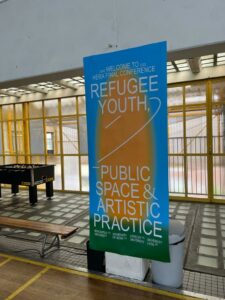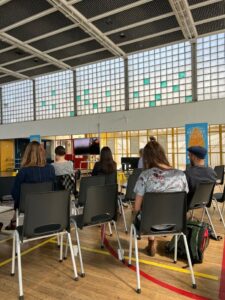News
Three things I learned as a student at the HERA conference on Refugee Youth, Public Space and Artistic Practice
Whilst attending the HERA Final Conference on the topic of Refugee Youth, Public Space and Artistic Practice, MIGFOODCITY research assistant Emilia Seidl participated in multiple panel sessions, a workshop and a discussion held in a world café themed setting. Here are three things she learned at the conference from a student’s perspective, which she will apply to her work on the MIGFOODCITY project.
- Food brings people together
 The confer ence was held at the community space BOOST in Amsterdam, which serves as a unique meeting place for newcomers and other members of the public. I myself experienced how easily this place brings people together whilst I sat down on a big table to enjoy my lunch outside. The food I got served was Sudanese, freshly cooked by members of BOOST and available to everyone for free. Sharing a table, I had the great opportunity to meet new people over lunch, due to the openness of the space and the friendliness of the community members using it. Although there were some language barriers, an interesting conversation sparked with everyone sitting on the table. This encounter showed me how food can serve as a way to connect people and how it allows complete strangers to engage in meaningful conversations with one another.
The confer ence was held at the community space BOOST in Amsterdam, which serves as a unique meeting place for newcomers and other members of the public. I myself experienced how easily this place brings people together whilst I sat down on a big table to enjoy my lunch outside. The food I got served was Sudanese, freshly cooked by members of BOOST and available to everyone for free. Sharing a table, I had the great opportunity to meet new people over lunch, due to the openness of the space and the friendliness of the community members using it. Although there were some language barriers, an interesting conversation sparked with everyone sitting on the table. This encounter showed me how food can serve as a way to connect people and how it allows complete strangers to engage in meaningful conversations with one another.
- Similar to food, media is a powerful tool in storytelling
“No matter where you are from; we all speak the same language of film.” The workshop “Making Media with Recently Arrived Migrants” held by the Dutch organization CommonFrames, revealed to me how media can serve as a tool for storytelling and self-expression, just like food. Similar to sharing a meal, making media serves as a way to connect people. Overall, regardless of one’s background, language speaking abilities and levels of education, everyone is able to understand film. CommonFrames is working with young migrants of whom the majority is aged between 12 to 18 years. The organization introduces them to the world of film and media and helps them to tell their own stories. Based on the project, the organization hopes to aid migrants with their language development, boost their self-confidence and creativity, help them to make new connections with their su
rroundings, increase their media literacy and support them in developing more social skills. Here are some interesting examples of media projects created by young migrants.
- Migrants can negotiate exclusionary public spaces through performance art (and possibly through food practices too)
Lastly, Dr. Malene Jacobsen, Marie Slodowska-Curie Fellow at Newcastle University, provided an insight onto the issue of the criminalization

of young migrants in Denmark. Newcomers there currently have to reclaim their right to public space, as government regulations increasingly try to
eliminate them from it. Especially young male migrants are affected, as there are new policies being set in place where the police can ban groups of men from trains and other public places because they “create insecurity” (Ritzau, 2020). However, these plans do not go unchallenged, as youth performance art is being used by the marginalized groups to protest these measures. Public space is often a meaningful place for migrants, and it is therefore highly important to grant them access to it. As the MIGFOODCITY project looks at how migrants negotiate the nature of public spaces through food practices, this panel talk reminded me to also highlight the meaning of public space for migrants in general when conducting research.
By attending the conference, I did not only get many insights into academic research on refugee youth, public space, and artistic practice but I also got to listen to the stories of many newcomers in a more informal setting. Overall, I realized that spending a day thinking and talking about important issues with people from all over the world can create very valuable outcomes, personal and professional.
Source
Ritzau. (2020, October 6). Regeringen: Bøde på 10.000 for at bryde nyt opholdsforbud – sker det to gange skal man i fængsel. NYHEDER. https://nyheder.tv2.dk/samfund/2020-10-06-regeringen-bode-pa-10000-for-at-bryde-nyt-opholdsforbud-sker-det-to-gange-skal

